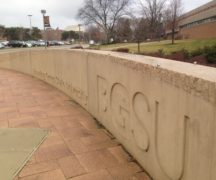By DAVID DUPONT
BG Independent News
The Bowling Green State University Board of Trustees Friday approved the creation of a new School of Nursing. The move comes as the university works to develop programs in high demand fields as a way of securing its financial future.
The university has been providing nursing training through a consortium with the University of Toledo, but that was dissolved in 2018, though BGSU students who began in the program will continue through graduation.
The university also, has a dual degree program with Mercy College of Ohio.
“Finally, we decided to determine our own destiny,” Provost Joe Whitehead told the trustees, and keeping tuition money instead of sending to another institution.
For the first time students will be able to come to BGSU as first year student and stay through earning their Bachelor of Science in Nursing, the industry standard, Whitehead said.
Last fall, the university also created an online program for registered nurses to earn their bachelor’s degrees.
This new nursing initiative will give students multiple entry points into nursing, Whitehead said.
“We, in the industry, need more nurses,” said National Trustee George Miller. The president and CEO of Loretto Hospital in Chicago noted his mother was a nurse. The supporting documents for the school state 30 percent of nurses in Ohio are 55 or older. That’s true nationwide, he said.
Miller said that the mission statement made no mention of “diversity and inclusion and cultural competency.” That is needed, he said, “as the complexion of patients will change over the years.”
Whitehead said those values will be emphasized in the program. The university will recruit a diverse faculty as a way of attracting a diverse student body.
In a related action, the trustees approved the renovation of the second and third floor of the Business Administration Annex into a Nursing Skills Lab.
At this point, those facilities are scattered about campus, Chief Financial Officer Sheri Stoll said. This will consolidate the nursing program.
The project will cost $3 million. The trustees previously approved $300,000 for engineering and design fees.
Construction will begin in January after the move of business programs to the Mauer Center and the relocation of a computer lab to the first floor are completed. It is expected to be finished by late summer, 2021.
Aiming to address another health care need, the trustees also approved the creation of a new School of Physical Therapy, also in the College of Health and Human Services.
The university will partner with consulting firm Evidence in Motion to create a two-year hybrid program. This will distinguish BGSU from the traditional three-year place bound program, and allow it to recruit students from across the country.
The program is in its infancy. The first step, Whitehead said, will be to hire a director to develop the program and secure accreditation.
“This whole process will take several years before we bring students in,” he said.
The documentation provided to trustees projects the program, which will cost $2.6 million to launch, will not have any tuition income until fiscal year 2023. The initial class is expected to have 80 students, growing to 100 within several years.
The trustees also approved two new master’s degree programs.
The Master of Science in Logistics and Systems Engineering would be a collaboration between the College of Technology, Architecture, and Applied Engineering and the College of Business. The coronavirus pandemic has highlighted the importance of the systems for moving goods to where they are needed, Whitehead said.
The program will be offered both in an online and hybrid format. When the program was discussed at Faculty Senate in May, MD Sarder, of the College of Technology faculty, said that the new master’s degree will appeal to international students, students from around the country, and local professionals.
The trustees also approved a new Master of Design in Integrative Design in the School of Art.
The major reflects the new reality of working in design, Whitehead said.
According to the proposal for the new degree: “Designers have transitioned from being the last in the chain of decision making to the forefront and within interdisciplinary teams developing strategies, defining audiences, connecting diverse stakeholders and innovating products and services with consideration for larger social and cultural contexts.”
The program is expected to enroll working professionals interested in enhancing their marketability.
The program will be offered as a low-residency, online hybrid program. With much of the course work done online and students coming to campus for short in-person sessions.
Both master’s degree programs now need final approval from the Ohio Department of Higher Education.
Also, at the meeting, trustees approved the latest phase of upgrading utility tunnels underneath campus. Stoll said the work is necessary because the Ridge Street Tunnel, built in 1992, is deteriorating. The work will also allow more buildings to be served by the three central chiller plants on campus. This is more efficient than having chillers for each building, Stoll said.
The total project cost is $5.4 million. The trustees had already approved professional fees. The remainder approved Friday is $4.8 million.
The trustees, meeting for the first time with former Ohio Attorney General Betty Montgomery as chair, welcomed three new members.
Russell Martin, Delaware County sheriff and a 1980 graduate of BGSU’s criminal justice program, will serve a nine-year term. Montgomery greeted him as “the new sheriff in town.”
Also, at their first meeting were: Estee Miller, a 2020 graduate of BGSU, now a graduate student in public administration, beginning a two-year term as graduate representative, a non-voting position, and George Miller, a 1973 BGSU graduate, as national trustee, a non-voting position.
In his remarks at the end of the meeting, Miller stated it was important to have conversations around the issues of race and social justice. “I want to hear all views,” he said. Referring the current concerns about the coronavirus as well as protests over social justice, he said: “There’s no vaccine for racism.”





